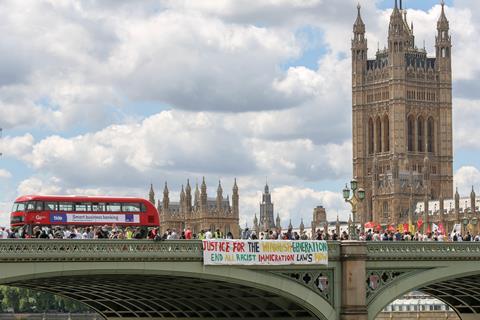Windrush, contaminated blood, child sexual abuse – the state claims victims of high-profile scandals don’t need lawyers to secure proper compensation. Experience suggests otherwise, reports Eduardo Reyes
What should follow an apology? It is nine years since David Cameron, then prime minister, formally apologised to 3,000 people in Scotland identified as having been infected by hepatitis C and HIV via contaminated blood. The UK total is now estimated to have been 30,000.
It is a year since Sir Brian Langstaff, appointed to chair the Infected Blood Inquiry in 2018, opened his interim report with the insistence that ‘a compensation scheme should be set up now and it should begin work this year’, adding ‘not only do the infections themselves and their consequences merit compensation, but so too do the wrongs done by authority, whose response served to compound people’s suffering’.
This week in the Lords, the government accepted a Labour amendment to the Victims and Prisoners Bill that will require a compensation scheme to be set up within three months of the law passing. It could be up and running by the end of 2024, but there are few details. What is more, Earl Howe, deputy leader of the Lords, warned that the creation of the new body could be delayed if parliament were dissolved or adjourned.
Some 100 victims have died in the last year. Yet no compensation has been given since a 2022 ‘interim payment’ of £100,000 to living victims and bereaved partners.
It is a similar story with the Windrush and Post Office compensation schemes, where the impact of injustices inflicted on individuals by, or with the assistance of, the state are compounded by the delays and complexity of securing adequate compensation.
The stories are heartbreaking, and outrage at inaction and delays is shared by the public. And yet that anger does not shift the dial when government pronounces on the general issue of compensation.
‘We continue to see negative comments from politicians upon the issue of damages generally,’ Paul Rumley, partner at RWK Goodman, tells the Gazette. He notes ‘repeated reference to a compensation culture’, despite research confirming it ‘does not exist’ but is a ‘myth perpetuated by people, including politicians, continually referring to this fiction’.
The question is, does that mindset, combined with a distrust of lawyers, translate into state and institutional approaches to compensation that literally shortchange victims?

A poor grasp
‘The government’s grasp of the principles of compensation, and how what they do impacts upon innocent, injured people, can be very poor, from my experience of working with many ministers and civil servants,’ is Rumley’s assessment. Recalling interactions he had when chair of the Society of Clinical Injury Lawyers, he adds: ‘We were continually taking people back to basic principles of tort law, to increase their knowledge foundation to then help them explore policy considerations.’
‘The issue around government compensation is not just the amount of compensation on offer,’ says Malcolm Johnson, legal director at Lime Solicitors, ‘but the appalling way in which compensation schemes are administered. We have seen this chaos with the Infected Blood, Windrush and Post Office schemes.’
Government, he observes, ‘has tried to run these schemes themselves, but very little thought goes into the practicalities of compensating hundreds if not thousands of people. And the machinery is always woefully under-resourced’.
‘We have certainly seen extreme reluctance on the part of the government to right the wrongs it was ultimately responsible for in the infected blood saga,’ says Des Collins, senior partner of Collins Solicitors, who acts for many of the victims. ‘It has taken years of battling to get where we are today, yet despite… overwhelming evidence heard at the public inquiry, an apology in the House of Commons from then prime minister David Cameron, and the government finally saying it has accepted the moral case for compensation, they continue to drag their feet on allocating an actual pot of money or deciding how compensation will be administered.’ It is ‘truly shameful in this case because people continue to die without seeing justice’, he adds.
So why the lack of progress? ‘I do believe they are trying to protect the public purse,’ Collins says. ‘The Treasury is very powerful. One view is that by repeatedly kicking my clients into the long grass, the state may have to pay out less in the long run.’
Away from the lawyers
Estimates for total compensation in the infected blood scandal put the figure at about £10bn. That sum certainly earns it the attention of the Treasury.
But ‘there is another reason’, says Collins, and that is ‘the extreme reluctance of the government to meet its obligations’.
He continues: ‘Any admission of legal liability would open the risk of prosecution of officials. That is what happened in France. So here, the state in all its layers, from Department of Health to civil service to NHS, has been assiduous in saying this is not our fault.’
Johnson, who has experience of acting for claimants in relation to a wide range of compensation schemes, draws attention to other considerations. ‘We have seen far better results with private sector and local authority schemes, where practicalities are considered from the very outset and long before the scheme gets under way,’ he says.
In particular, he has experience of schemes set up to compensate people who were abused as children due to institutional failures. Legal representation, and the involvement of lawyers, is central to their success, he says.
‘The Lambeth Children’s Homes Redress Scheme is a case in point,’ Johnson says. The scheme was designed and run with the assistance of law firm Kennedys. Johnson notes: ‘Nearly all of the applicants received their damages intact because their solicitors were prepared to accept the costs on offer.’
The average time to achieve compensation for clients through the Lambeth scheme was two years.
The Jesus Fellowship Church (known as the ‘Jesus Army’), meanwhile, set up a scheme to compensate former members who were survivors of abuse. It was ‘simpler’ than the Lambeth scheme, Johnson says, but still paid legal costs of up to £2,500. Working to a system of tariffs, compensation has been awarded in as little as six months.
The Church of England’s Redress Scheme, like Lambeth’s, is being established with the assistance of Kennedys. Solicitors will be involved in its administration, though the position on abuse survivors’ legal costs is not yet clear, Johnson notes.
His conclusion is that legal representation is a game-changer for victims. ‘In the Windrush Scheme, many applicants were left without any recourse to legal representation, although there was assistance provided by voluntary organisations and some solicitors’ firms on a pro bono basis,’ Johnson points out. ‘Alternatively, these applicants paid their solicitors out of their compensation.’
Government’s apparent antipathy to claimant representation has played a part in the scheme’s failures, he insists: ‘In my view, the government’s assurances in relation to the Windrush Scheme about how it would not be necessary to instruct solicitors proved hollow, and many survivors were left completely baffled by what proved to be a complex and difficult scheme to navigate.
‘I would also add that we have seen appalling delays with the Windrush Scheme, where some applicants have… died waiting for their compensation,’ Johnson adds. ‘We are now seeing similar problems with the government’s Post Office compensation scheme.’
A mindset on compensation
Away from formal compensation schemes, civil justice reforms have been implemented or mooted which reflect the government’s mindset on the issue of compensation. The results of that mindset affect the wider compensation landscape.
Rumley points to Jeremy Hunt’s support for ‘no-fault compensation’ in medical negligence cases. It is, he says, ‘another example of a loose association between policy and reality’. It has never been costed – ‘which is somewhat surprising for someone [now] in charge of the Treasury’, Rumley notes.
‘We see time and again the government being on record as supporting the 100% compensation principle, but then acting to undermine it,’ he adds. On ‘various fixed costs regimes’, he notes, ‘the government is repeatedly told [these] will result in increased deductions from innocent injured people’s damages, meaning that the 100% compensation principle cannot be upheld in practice’.
'The introduction of fixed recoverable costs is almost certainly driven by a desire on the part of the government to reduce cost with little concern about the impact of this on claimants'
Anne Kavanagh, Irwin Mitchell
Costs reforms, Irwin Mitchell partner Anne Kavanagh says, will be a challenge for dispute resolution mechanisms in medical negligence cases that sit within a system that works relatively well. ‘We have the benefit of working within a well-established system,’ she notes.

Notification of a claim against an NHS Trust automatically leads to referral to NHS Resolution, the professional body established to investigate those claims and funded to pay compensation where it is awarded by a court or negotiated between the parties where negligence has been proven. ‘We have good working relationships with NHS Resolution,’ Kavanagh says, ‘and in the vast majority of those cases, we have not encountered… institutional resistance to payment of compensation where negligence is proven.’
She adds: ‘Having said that, the introduction of fixed recoverable costs (FRC) to all medical negligence cases valued at £100,000 or below is likely to impact adversely on the significantly improved collaboration which has been achieved between NHS Resolution and claimant solicitors. That collaboration has benefited claimants, leading to rapid resolution of cases often through the adoption of ADR.’
The introduction of FRC, Kavanagh concludes, ‘is almost certainly driven by a desire on the part of the government to reduce cost with little concern about the impact of this on claimants, many of whom will struggle to find representation and are likely to place further pressure on the courts system as litigants in person’.
A better way
Sir Brian Langstaff’s final report is expected on 20 May. At that point, Collins predicts, the ‘assiduous’ position taken by the Department of Health and Social Care, the Civil Service and the NHS in denying fault will ‘become untenable’.
The imminence of the final report may have led to the government’s decision to concede a body to administer the scheme this week, albeit with the caveat that even now a general election might delay its establishment. Johnson says lessons should be drawn from schemes such as that run by Lambeth for survivors of childhood abuse.
‘Obviously these are much smaller schemes than the government-run schemes, but that does not mean to say that the smaller-scheme approach cannot be applied,’ he argues. ‘At the heart of all this chaos is the deep reluctance on the part of government to finance legal representation for applicants, something that is key to a successful scheme. Instead, government propagates the myth that people don’t really need lawyers to apply to these schemes and that the benevolence of the state will solve all issues.’



































